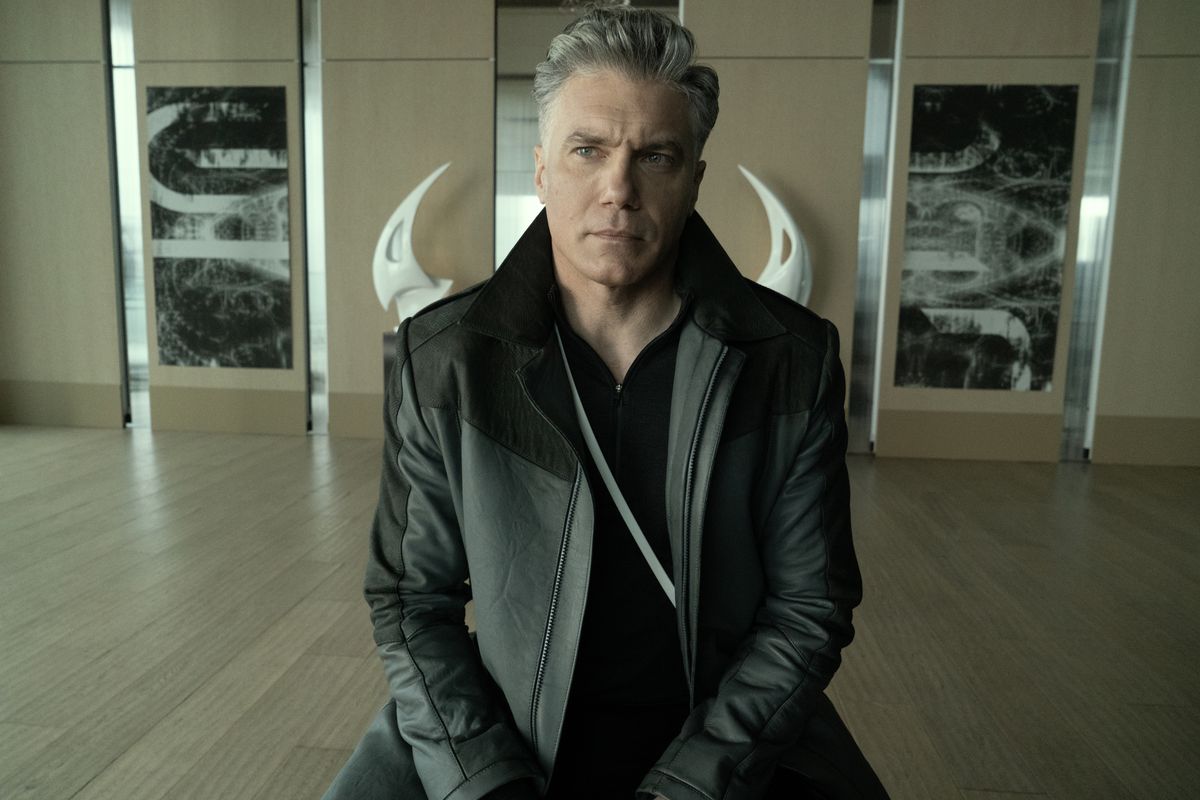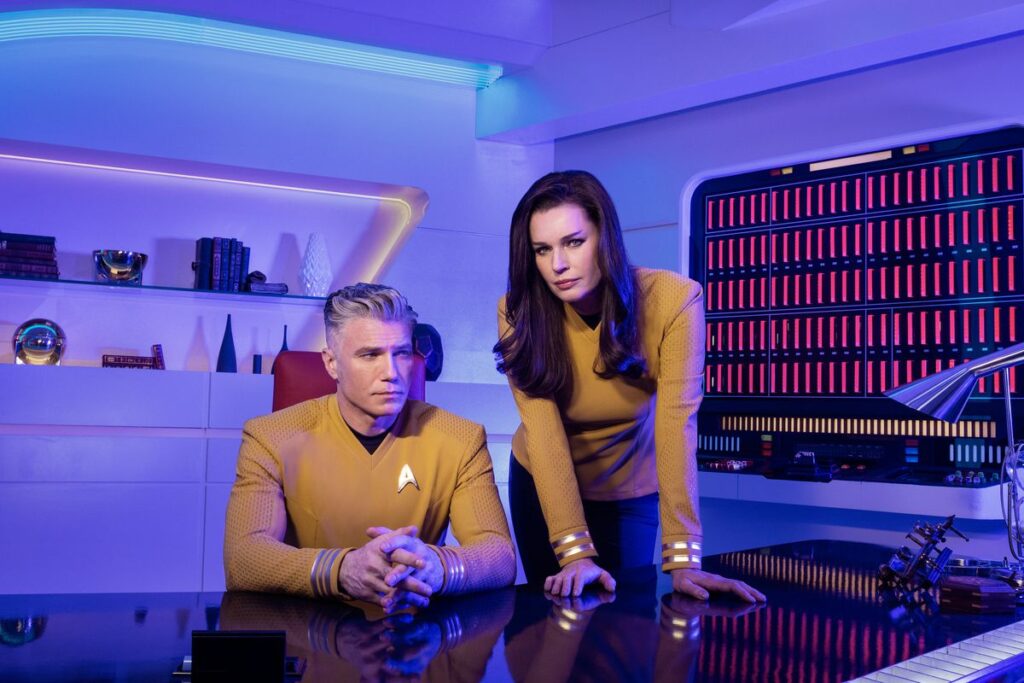Star Trek is not the first thing that comes to mind when you say “legal procedural,” but maybe it should be, considering the franchise’s love affair with putting courts into outer space.
“The Measure of a Man” — the early Next Generation episode universally regarded as one of the best hours of Trek ever made, if not the best — probably clinched Trek’s love affair with legal drama. But let us not forget that The Next Generation began its series premiere and ended its series finale with Q putting Captain Picard, specifically, on trial for the fate of all humanity.
And the very existence of Star Trek: Strange New Worlds — which this week airs its own first courtroom episode, “Ad Astra per Aspera” — owes itself to Star Trek’s first ever trial episode, “The Menagerie,” which introduced Captain Pike and first officer Number One.
So it’s only fitting that “Ad Astra per Aspera,” the trial episode of a show that only exists because of Star Trek’s terminal love affair with the trial episode, is perhaps the most perfect Star Trek Trial Episode.
[Ed. note: This piece contains spoilers for Star Trek: Strange New Worlds season 2 episode 2.]
Photo: Kharen Hill/Paramount Plus
The Star Trek trial episode is a trope as worn as a dog-eared paperback and as comfortable as an old sweater. Why dance around the sci-fi metaphor you made up, when you can just turn the captain into a trial lawyer and have them declare the point you’re trying to make out loud, as if Atticus Finch and Flash Gordon had been caught in a transporter accident?
It doesn’t even have to be about a big metaphor. It could just feature Starfleet administrative investigations or good old baffling alien court systems, as seen in episodes like the Original Series’ “Court Martial;” TNG’s “The First Duty,” “The Drumhead,” “A Matter of Perspective,” and “Rules of Engagement;” Deep Space Nine’s “Tribunal,” Enterprise’s “Judgement,” and Lower Decks’ “Veritas,” which parodies the entire idea of the crew accidentally winding up facing an alien court’s death penalty for something they had no idea was illegal.
But just as often, the trial is about a lot more than a space court martial or Starfleet breaking some heretofore unknown alien law; and just as often, the show’s crew wind up standing in for actual legal counsel. Like in “The Measure of a Man,” in which the captain has to defend a subordinate’s personhood; or “Dax,” where the commander has to defend a subordinate’s personhood; or “Death Wish,” where the captain has to defend a Q’s right to die; or “Sins of the Father,” where the captain becomes an advocate in a Klingon court; or “Distant Origin,” in which the first officer becomes the advocate at the Scopes Monkey Trial, but for space dinosaurs; or “Devil’s Due,” where the captain demands formal arbitration proceedings in order to release an entire planet from a contract with the actual devil.
The great thing about these episodes is the way they allow Star Trek to take the heart of the franchise — empathy, discovery, the triumph of intellect and romance over brute force and cynicism — and put the subtext where the text is. The characters may be debating philosophy, but at its best, it’s a philosophy that’s immensely trenchant to our earthbound life. “The Measure of a Man” may be a little hamfisted about it, but it’s not wrong to have a character say, baldly, that legally determining someone who seems like a person to be “not a person” is the first flagstone on the paved path to slavery.
The problem with these episodes is that when they’re not, say, among the best episodes of television ever produced, the seams in the formula start to show. You start to notice their patterns: Some kind of outsider’s personhood is questioned, and it can only be defended by sitting them, impotent and quiet, in a witness box while the episode focuses all the cameras on the highest ranking officer the show can logistically provide.
It’s most noticeable in episodes like “Dax,” which is basically just “The Measure of a Man,” but instead of Captain Picard advocating for Data’s personhood to Starfleet, it’s Commander Sisko advocating for his understanding of Trill officer Jadzia Dax’s personhood to… one of the most revered edifices of Trill culture. Or like “Sins of the Father,” where circumstances demand that Jean Luc Picard, a human captain, must become an advocate in a Klingon high court case about Worf’s family and the succession of leadership in the empire.
Now, I love to watch Patrick Stewart and Avery Brooks orating the house down as much as anyone, but it begs the question: When does the alien accused get to talk? Why is our focal point always a heroic member of the establishment, rather than the actual injured party? Where’s the trial episode that establishes a minority’s personhood beyond a doubt without shifting focus away from the minority to the majority’s beneficent heroism?
You could say Next Generation’s “The Outcast,” a vanishingly rare exception where the whole plot goes show-trial-shaped at the last second, but the alien accused/metaphor for queer identity actually gets to do the big bold speech that full-throatedly advocates for queer personhood in the barbaric year of 1992.
But as of this week, you could also say Strange New World’s “Ad Astra Per Aspera,” credited to writer Valerie Weiss. Because in the trial of secretly Illyrian first officer Una Chin-Riley (Rebecca Romijn), Weiss had the good sense to keep Captain Pike the hell out of the courtroom.

Photo: Michael Gibson/Paramount Plus
In the first season’s cliffhanger ending, Starfleet internal affairs uncovered Una’s secret — that she masqueraded as human in order to become a Starfleet officer — sending her straight to court martial with an option for banishment. As unpacked in season 1, Una is actually an Illyrian, a species that has incorporated genetic enhancement into its space exploration and cultural practices, and she holds those enhancements within her own genetic code.
The Federation, however, outlaws genetic enhancement, and has long refused to accept Illyrians into its ranks unless they abandon their traditions. This stricture is thanks to the organization’s human founding members, who brought with them a cultural taboo against genetic tampering dating back to the Eugenics Wars, a terrestrial nuclear conflict that nearly sent Earth back to the Dark Ages.
“Ad Astra” is so knowingly a trial episode that it even jokes about the Captain’s proclivity to big speeches. But in fact, as the episode takes pains to point out, Pike can’t testify in the trial, because he helped Una hide. If he takes the stand he would only be asked under oath to incriminate himself, destroying his career and the lives of his crew.
That leaves the episode in want of a lawyer, the canny orator with a personal stake in the outcome who can banter words with the prosecution, the accused, and the judge alike. “Ad Astra” boldly goes where Star Trek has so rarely gone before: It finds a lawyer who isn’t on the bridge crew. It finds a lawyer who is an Illyrian, just like the accused.
Yetide Badaki (American Gods) guests in a forceful turn as Neera, a childhood friend of Una’s who just so happens to be an Illyrian civil rights lawyer, transforming a mere court martial into a test balloon for Illyrian rights in the Federation. In franchise terms, the outcome is predetermined. Una’s rank will remain intact, and so will the Federation’s strict anti-genetic tampering laws. Those elements are locked within the bedrock of Star Trek canon.
But between the two Illyrian characters and the two actresses embodying them, they deliver one of the all-time great Star Trek trials. If Una takes a backseat to her lawyer in the show’s most dramatic moments, it’s only for Neera to deliver oratory that comes from the same experiences, the same culture, the same plight. While Neera demands that Starfleet look her people in the eye when they say that anti-Illyrian laws are rooted in safety rather than centuries-old prejudice, Una has her moment to hold forth on the terror of keeping one’s identity secret from an early age, and the promise of acceptance and inclusion that rang so strongly from the mere idea of Starfleet that she chose to deny who she was to become a part of it.
The simple, bifurcated truth of Star Trek trial episodes is that they are a contrivance, and they rule. And you have to be careful with contrivances or they will, surprise, come off as contrived; or worse, have a subtextual meaning (this maybe-not-a-person should be quiet and let a person advocate for them) that diminishes your text (this maybe-not-a-person is a person, period).
The Star Trek trial episode wasn’t exactly broken, but “Ad Astra ad Aspera” fixed it regardless. “The Measure of a Man” finally has a successor worthy of the name.

